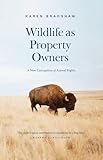Wildlife as property owners : a new conception of animal rights / Karen Bradshaw.
Publisher: Chicago : University of Chicago Press, [2020]Description: 203 pages ; 23 cmContent type:- text
- unmediated
- volume
- 9780226571225
- 9780226571362
- 346.7304 23
- KF3841 .B73 2020
| Item type | Current library | Shelving location | Call number | Status | Notes | Barcode | |
|---|---|---|---|---|---|---|---|
 BOOKs
BOOKs
|
National Law School | General Stacks | 346.7304 BRA (Browse shelf(Opens below)) | Available | Recommended by Dr. Gayathri Naik | 40262 |
Includes bibliographical references (pages 161-187) and index.
A foundational understanding of animal property law. The nexus of animal rights and the rights of nature ; Biodiversity loss as a property law problem -- Revealing the existing body of animal property rights. The biological origins of property ; Uncovering animal rights in existing property law -- A roadmap for property ownership to benefit biodiversity ; Using legal trusts to implement a system of animal property rights ; Traditional legal pathways to formalizing animal property rights ; Leveraging property rights to aid biodiversity ; Case studies of stakeholder collaborations managing resource competition between humans and wildlife. Case study 1: Ranchers and wild horses in the West ; Case study 2: Outsourcing thick-billed parrot recovery to Mexico ; Case study 3: Traditional ecological knowledge and scientific management of caribou -- Analyzing the potential of animal property ownership ; Evaluating a property-based approach to biodiversity preservation ; The Implications for interspecies ownership on property theory -- Conclusion: Are animal property rights the rights of nature?
"Humankind coexists with every other living thing. People drink the same water, breathe the same air, and share the same land as other animals. Yet, property law reflects a general assumption that only people can own land. The effects of this presumption are disastrous for wildlife and humans alike. The alarm bells ringing about biodiversity loss are growing louder, and the possibility of mass extinction is real. Anthropocentric property is a key driver of biodiversity loss, a silent killer of species worldwide. If excluding animals from a legal right to own land is causing their destruction, extending the legal right to own property to wildlife may prove its salvation. This book advocates for folding animals into our existing system of property law, giving them the option to own land just as humans do"-- Provided by publisher.
There are no comments on this title.
